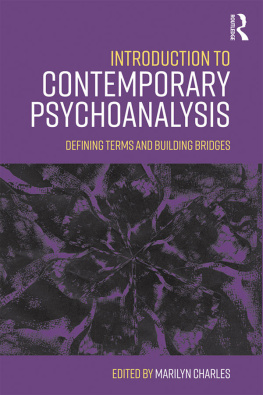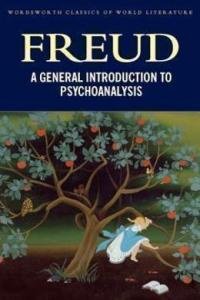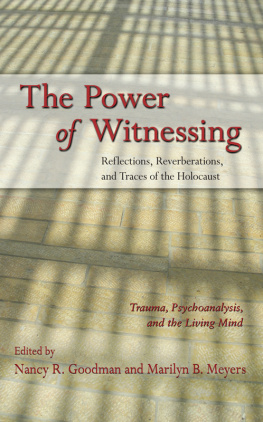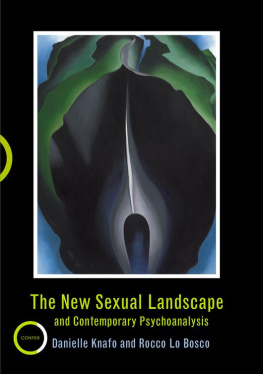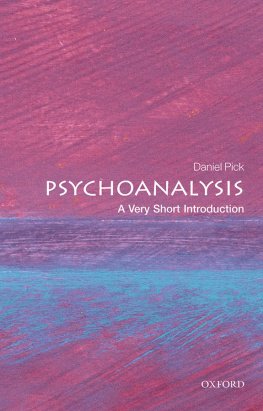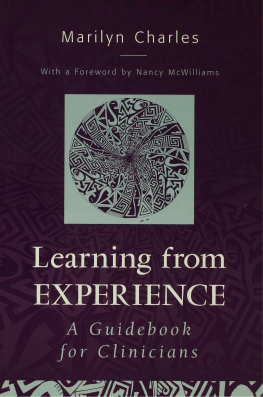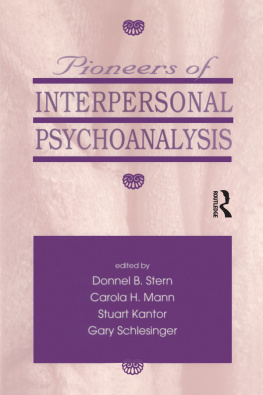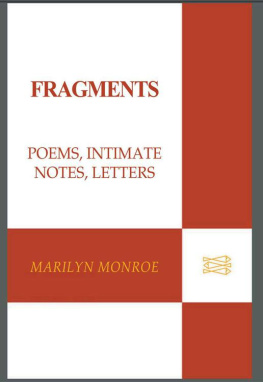Edited by Marilyn Charles - Introduction to Contemporary Psychoanalysis
Here you can read online Edited by Marilyn Charles - Introduction to Contemporary Psychoanalysis full text of the book (entire story) in english for free. Download pdf and epub, get meaning, cover and reviews about this ebook. year: 2017, publisher: Taylor and Francis, genre: Romance novel. Description of the work, (preface) as well as reviews are available. Best literature library LitArk.com created for fans of good reading and offers a wide selection of genres:
Romance novel
Science fiction
Adventure
Detective
Science
History
Home and family
Prose
Art
Politics
Computer
Non-fiction
Religion
Business
Children
Humor
Choose a favorite category and find really read worthwhile books. Enjoy immersion in the world of imagination, feel the emotions of the characters or learn something new for yourself, make an fascinating discovery.
- Book:Introduction to Contemporary Psychoanalysis
- Author:
- Publisher:Taylor and Francis
- Genre:
- Year:2017
- Rating:5 / 5
- Favourites:Add to favourites
- Your mark:
- 100
- 1
- 2
- 3
- 4
- 5
Introduction to Contemporary Psychoanalysis: summary, description and annotation
We offer to read an annotation, description, summary or preface (depends on what the author of the book "Introduction to Contemporary Psychoanalysis" wrote himself). If you haven't found the necessary information about the book — write in the comments, we will try to find it.
Introduction to Contemporary Psychoanalysis — read online for free the complete book (whole text) full work
Below is the text of the book, divided by pages. System saving the place of the last page read, allows you to conveniently read the book "Introduction to Contemporary Psychoanalysis" online for free, without having to search again every time where you left off. Put a bookmark, and you can go to the page where you finished reading at any time.
Font size:
Interval:
Bookmark:
We no longer teach psychoanalysis, in the singular. These days, we teach psychoanalyses, in the plural. There is now a wide ranging diversity of psychoanalytic schools and perspectives, each featuring their own terms, traditions, principles, and technical implications. With Marilyn Charles superb collection: Introduction to Contemporary Psychoanalysis: Defining Terms and Building Bridges, we have a single text that introduces the major orientations. Each chapter is written by an expert in the approach, and a unique feature is that many chapters discuss how the schools relate to each other and how they may be combined by the individual practitioner to suit that clinicians individual personality and idiom.
Lewis Aron, Ph.D., Director, New York University Postdoctoral Program in Psychotherapy & Psychoanalysis
Psychoanalysis has gone from being a monolithic Truth to a loose congeries of positions that have agreed to disagreeand maybe sometimes agree. How and in what way these contemporary positions align themselves with each other, theoretically, clinically and politically, remains obscure. In this brilliantly edited volume, Dr. Charles allows a series of distinguished authors to explicate their positions, including an assessment of its limitationsa thematic that postulates that every position ultimately becomes a countertransference; and that our success depends more on integrating positions that establishing some new superordinate Truth. This thoughtful, well-organized and informative volume should be indispensable to anyone, in or out of the field, in search of some coherence in our current disorder.
Edgar A. Levenson, Fellow Emeritus, Training, Supervisory Analyst and Faculty at the William Alanson White Institute. Adjunct Clinical Professor of Psychology at the New York University Graduate Studies Division, Honorary Fellow at the Postgraduate Center for Mental Health, Honorary Member of the American Psychoanalytic Association, Life Fellow of the American Academy of Psychoanalysis, and Distinguished Life Fellow of the American Psychiatric Association
This book respects all the contemporary schools of thought; psychoanalysis is tribal territory, where controversy is rife and not always respectful. It brings together in the palm of the hand all the strands that currently exist, but which head off in their own direction without concern for the whole. The field of view is also strewn with obstacles as words and ideas subtly change their exact meanings in the course of migration over time. So, such a project is not easy. Nor is it usual, as one frequent answer is a simplistic pluralism; anything goes, and the more ideas the merrier we shall be. Less frequent is the much more important stance we find here. Specialists survey their own frame of reference and deliver the reader the wherewithal to make our own assessments and comparisons.
Bob Hinshelwood, Emeritus Professor, Centre for Psychoanalytic Studies, University of Essex, UK
Introduction to Contemporary Psychoanalysis
This book provides a clear introduction to the main contemporary psychoanalytic theoretical perspectives. Psychoanalysis is often thought of as an obscure and outdated method, and yet those familiar with it recognize the profound value of psychoanalytic theory and technique. Part of the obscurity may come from psychoanalytic language itself, which is often impenetrable. The complexity of the subject matter has lent itself to a confusion of tongues, and yet, at base, psychoanalysis remains an earnest attempt to make sense of and ease human distress.
Introduction to Contemporary Psychoanalysis seeks to make this rich wealth of information more accessible to clinicians and trainees. Psychoanalytic clinicians from various schools here describe the key ideas that underlie their particular perspective, helping the reader to see how they apply those ideas in their clinical work. Inviting the contributors to speak about their actual practice, rather than merely providing an overview, this book helps the reader to see common threads that run across perspectives, but also to recognize ways in which the different lenses from each of the perspectives inform interventions. Through brief vignettes, the reader is offered an experience-near sense of what it might be like to apply those ideas in their own work. The contributors also note the limits or weaknesses of their particular theory, inviting the reader to consider the broader spectrum of these diverse offerings so that the benefits of each might be more visible.
Introduction to Contemporary Psychoanalysis offers readers the richness and diversity of psychoanalytic theory and technique, so that the advantages of each particular lens might be visible and accessible as a further tool in their clinical work. This novel, comparative work will be an essential text for any psychoanalyst or psychoanalytically inclined therapist in training, as well as clinicians and those who teach psychoanalytic theory and technique.
Marilyn Charles is a psychologist and psychoanalyst at the Austen Riggs Center, in Stockbridge, Massachusetts, and on faculty at Harvard Medical School, Boston Graduate School of Psychoanalysis, and the University of Monterrey. She serves as Contributing Editor of Psychoanalysis, Culture and Society and has published over one hundred articles and book chapters and six books, including Psychoanalysis and Literature: The Stories We Live (2015).
Introduction to Contemporary Psychoanalysis
Defining Terms and Building Bridges
Edited by Marilyn Charles

First published 2018
by Routledge
2 Park Square, Milton Park, Abingdon, Oxon OX14 4RN
and by Routledge
711 Third Avenue, New York, NY 10017
Routledge is an imprint of the Taylor & Francis Group, an informa business
2018 selection and editorial matter, Marilyn Charles; individual chapters, the contributors
The right of the editor to be identified as the author of the editorial material, and of the authors for their individual chapters, has been asserted in accordance with sections 77 and 78 of the Copyright, Designs and Patents Act 1988.
All rights reserved. No part of this book may be reprinted or reproduced or utilised in any form or by any electronic, mechanical or other means, now known or hereafter invented, including photocopying and recording, or in any information storage or retrieval system, without permission in writing from the publishers.
Trademark notice: Product or corporate names may be trademarks or registered trademarks, and are used only for identification and explanation without intent to infringe.
British Library Cataloguing in Publication Data
A catalogue record for this book is available from the British Library
Library of Congress Cataloging in Publication Data
Names: Charles, Marilyn, editor.
Title: Introduction to contemporary psychoanalysis : defining terms and building bridges / edited by Marilyn Charles.
Description: Abingdon, Oxon ; New York, NY : Routledge, 2018. | Includes bibliographical references and index.
Identifiers: LCCN 2017014357 | ISBN 9781138749870 (hardback : alk. paper) | ISBN 9781138749887 (pbk. : alk. paper) | ISBN 9781351718400 (web pdf) | ISBN 9781351718387 (mobi/kindle)
Subjects: LCSH: Psychoanalysis.
Classification: LCC BF173 .I4745 2018 | DDC 150.19/5dc23
LC record available at https://lccn.loc.gov/2017014357
ISBN: 978-1-138-74987-0 (hbk)
ISBN: 978-1-138-74988-7 (pbk)
ISBN: 978-1-315-18012-0 (ebk)
Typeset in Bembo
by Out of House Publishing
This book is dedicated to Grant Justin King and to Carson Laura King, whose indefatigable love, curiosity and joy renew my spirit and give me hope for the future.
Next pageFont size:
Interval:
Bookmark:
Similar books «Introduction to Contemporary Psychoanalysis»
Look at similar books to Introduction to Contemporary Psychoanalysis. We have selected literature similar in name and meaning in the hope of providing readers with more options to find new, interesting, not yet read works.
Discussion, reviews of the book Introduction to Contemporary Psychoanalysis and just readers' own opinions. Leave your comments, write what you think about the work, its meaning or the main characters. Specify what exactly you liked and what you didn't like, and why you think so.

